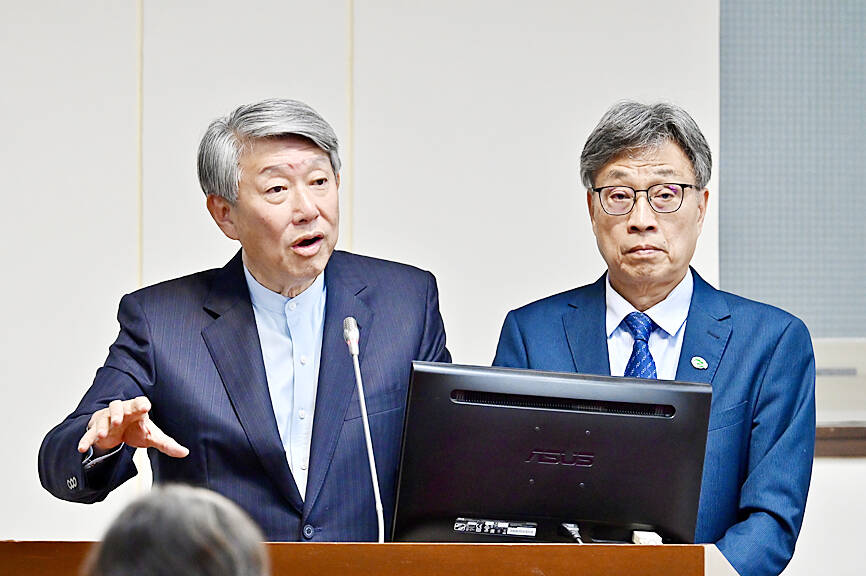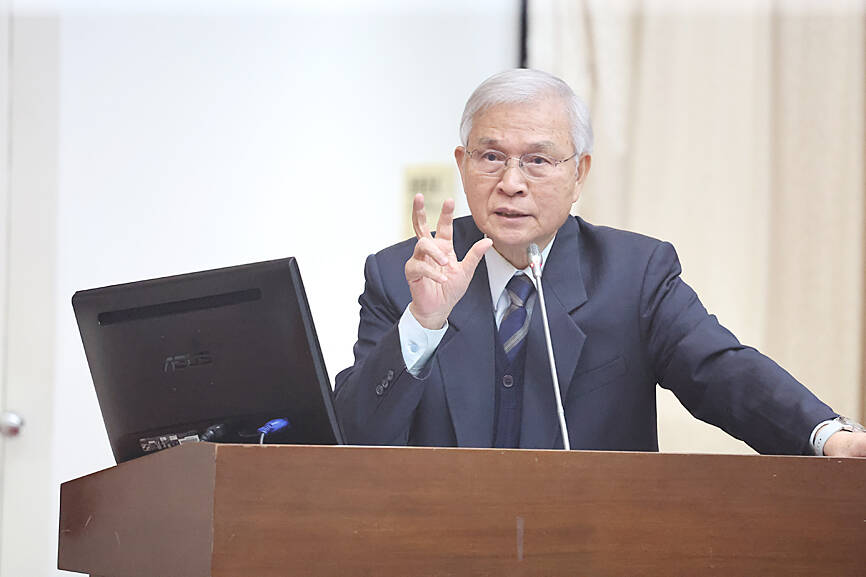Minister of Economic Affairs J.W. Kuo (郭智輝) yesterday outlined five measures to tackle rules of origin circumvention, which he said is one of four key areas in Taiwan-US tariff negotiations.
The measures are stronger monitoring of goods from China, communicating with Taiwanese businesses, establishing a blacklist of violators, imposing stricter penalties and applying anti-dumping tools, Kuo said at a meeting of the legislature’s Economics Committee in Taipei.
Stricter monitoring would target goods redirected to Taiwan and those rerouted through Taiwan to the US, Kuo said.

Photo: George Tsorng, Taipei Times
It is intended to prevent trade activities that could “affect the US’ judgement of Taiwan,” he added.
“Origin laundering” refers to the deceptive practice of companies misrepresenting a product’s country of origin to make it appear as though it was manufactured somewhere else, often to avoid tariffs or trade restrictions.
The minister made the comments along with Minister of Agriculture Chen Junne-jih (陳駿季) and Deputy Minister of Finance Lee Ching-hua (李慶華) as the government aims to address how Taiwan plans to sustain competitiveness in its agriculture, aquaculture, livestock and critical manufacturing sectors in the wake of US President Donald Trump’s “reciprocal” tariff policy.

Photo: CNA
Asked by Democratic Progressive Party Legislator Lai Jui-lung (賴瑞隆) whether the government was adequately prepared to weather economic turbulence triggered by Trump’s new tariff policy, Kuo said that as many exporters to the US face a uniform 10 percent tariff rate, Taiwan remains “highly competitive” due to its industrial strengths.
Taiwan and the US maintain “mostly complementary” trade in technology and other sectors, he added.
As the Presidential Office and the Cabinet started consultations with industry groups yesterday afternoon, Kuo said the government would continue listening to the private sector to identify areas for improvement.
At a separate meeting of the legislature’s Finance Committee yesterday, central bank Governor Yang Chin-long (楊金龍) said that uncertainty surrounding US tariffs remained, despite Trump’s decision overnight to pause planned tariffs on goods from more than 75 countries for 90 days, excluding China.
Apart from the great uncertainty for the stock market, a trade war and the hefty tariffs imposed by the US and China on each other is also not good for the global economy, Yang said.
“The only way for Taiwan to deal with this uncertainty is negotiation,” cable TV station USTV quoted Yang as saying.
Replying to a question raised by Chinese Nationalist Party (KMT) Legislator Lin Te-fu (林德福) whether there is room for upward revisions to the nation’s consumer price index (CPI) and core CPI this year, Yang said the central bank still believes consumer prices would remain stable in the face of a potential tariff hit.
It is too early to judge whether the local stock market is about to enter a bear market following days of turmoil caused by Trump’s tariff policy, Yang said, adding that the market’s long-term outlook would reflect the fundamentals.
The central bank would assess whether to increase Taiwan’s holdings of US Treasury bonds in its foreign exchange reserves, Yang said.
“At present more than 80 percent is ideal,” he said.
Additional reporting by Chen Cheng-hui

TARIFFS: The global ‘panic atmosphere remains strong,’ and foreign investors have continued to sell their holdings since the start of the year, the Ministry of Finance said The government yesterday authorized the activation of its NT$500 billion (US$15.15 billion) National Stabilization Fund (NSF) to prop up the local stock market after two days of sharp falls in reaction to US President Donald Trump’s new import tariffs. The Ministry of Finance said in a statement after the market close that the steering committee of the fund had been given the go-ahead to intervene in the market to bolster Taiwanese shares in a time of crisis. The fund has been authorized to use its assets “to carry out market stabilization tasks as appropriate to maintain the stability of Taiwan’s

STEEP DECLINE: Yesterday’s drop was the third-steepest in its history, the steepest being Monday’s drop in the wake of the tariff announcement on Wednesday last week Taiwanese stocks continued their heavy sell-off yesterday, as concerns over US tariffs and unwinding of leveraged bets weighed on the market. The benchmark TAIEX plunged 1,068.19 points, or 5.79 percent, to 17,391.76, notching the biggest drop among Asian peers as it hit a 15-month low. The decline came even after the government on late Tuesday authorized the NT$500 billion (US$15.2 billion) National Stabilization Fund (國安基金) to step in to buoy the market amid investors’ worries over tariffs imposed by US President Donald Trump. Yesterday’s decline was the third-steepest in its history, trailing only the declines of 2,065.87 points on Monday and

TARIFF CONCERNS: The chipmaker cited global uncertainty from US tariffs and a weakening economic outlook, but said its Singapore expansion remains on track Vanguard International Semiconductor Corp (世界先進), a foundry service provider specializing in producing power management and display driver chips, yesterday withdrew its full-year revenue projection of moderate growth for this year, as escalating US tariff tensions raised uncertainty and concern about a potential economic recession. The Hsinchu-based chipmaker in February said revenues this year would grow mildly from last year based on improving supply chain inventory levels and market demand. At the time, it also anticipated gradual quarter revenue growth. However, the US’ sweeping tariff policy has upended the industry’s supply chains and weakened economic prospects for the world economy, it said. “Now

An employment discrimination lawsuit against contract chipmaker Taiwan Semiconductor Manufacturing Co (TSMC, 台積電) might soon be expanded after a hearing in a federal court in San Jose, California, on Tuesday to add 15 plaintiffs to the case. According to a court document, the lawsuit, which was refiled in November last year as a form of a class action with 13 plaintiffs in California, wants to add 15 plaintiffs from Arizona, where TSMC is building up its wafer fab capacity. TSMC first committed between 2020 and last year to invest US$65 billion in three advanced wafer fabs in Arizona. It then pledged an